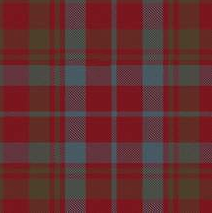







Lumsden Tartans
modern
Before the twentieth century, almost all dyeing used vegetable dyes. The advent of chemical dyes in the mid-1800s introduced the possibility of stronger and brighter shades, which became immediately popular, appealing to Victorian sensibilities with their liking for strong colour schemes. Tartans woven in 'Modern Colours' are characterised by darker and more vivid shades.
ancient
Ancient tartan colours are lighter in tone, as if using natural dyes. In the 1950s weavers began to create lighter toned variants once the novelty of strongly toned 'Modern' dyestuffs was starting to ebb, and a fashion re-emerged for older-looking colours. The lighter tones often make a tartan's sett (pattern) easier to distinguish than in Modern colours.
reproduction
Probably the most historically authentic tartans on the market, authentic in colour and design to those worn in 1745 and before. They have a soft muted effect reminiscent of the days when vegetable sources such as lichen, moss and alder bark provided the dyer's raw materials.
lumsden of boghead

modern

ancient

reproduction
Reconstruction of a double plaid made at Boghead of Kintore in 1797 by Margaret Lumsden.
lumsden hunting

modern

ancient

reproduction
Designed by Peter MacDonald at the request of David Lumsden of Cushnie to provide a hunting tartan for the clan. Designed to provide a day tartan less bright than the other Lumsden tartans.
ordering lumsden tartan

to order lumsden tartan made by DC Dalgliesh
click here to go to clan.com and fill in the form


Nowadays we produce all kinds of tartan. But traditional weaving is our lifeblood. Learn about how we still hand-weave short lengths on our unique single-width looms, and the hand-production methods that make these fabrics so special.
See the amazing weaving process here

Watch this 7 minute video on how tartans are made at DC Dalgliesh

Lumsden tartan comes in various designs and weights.















